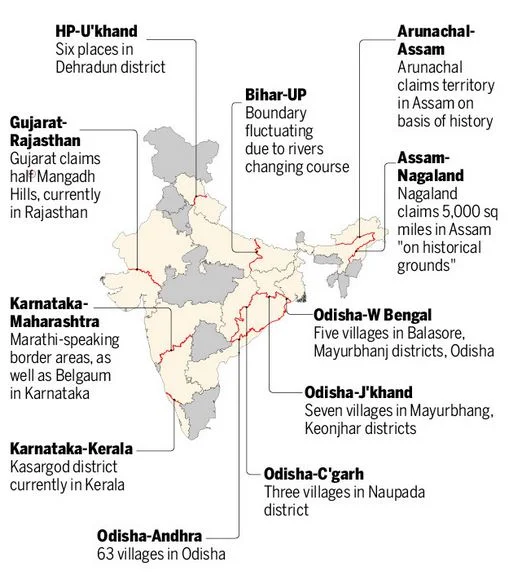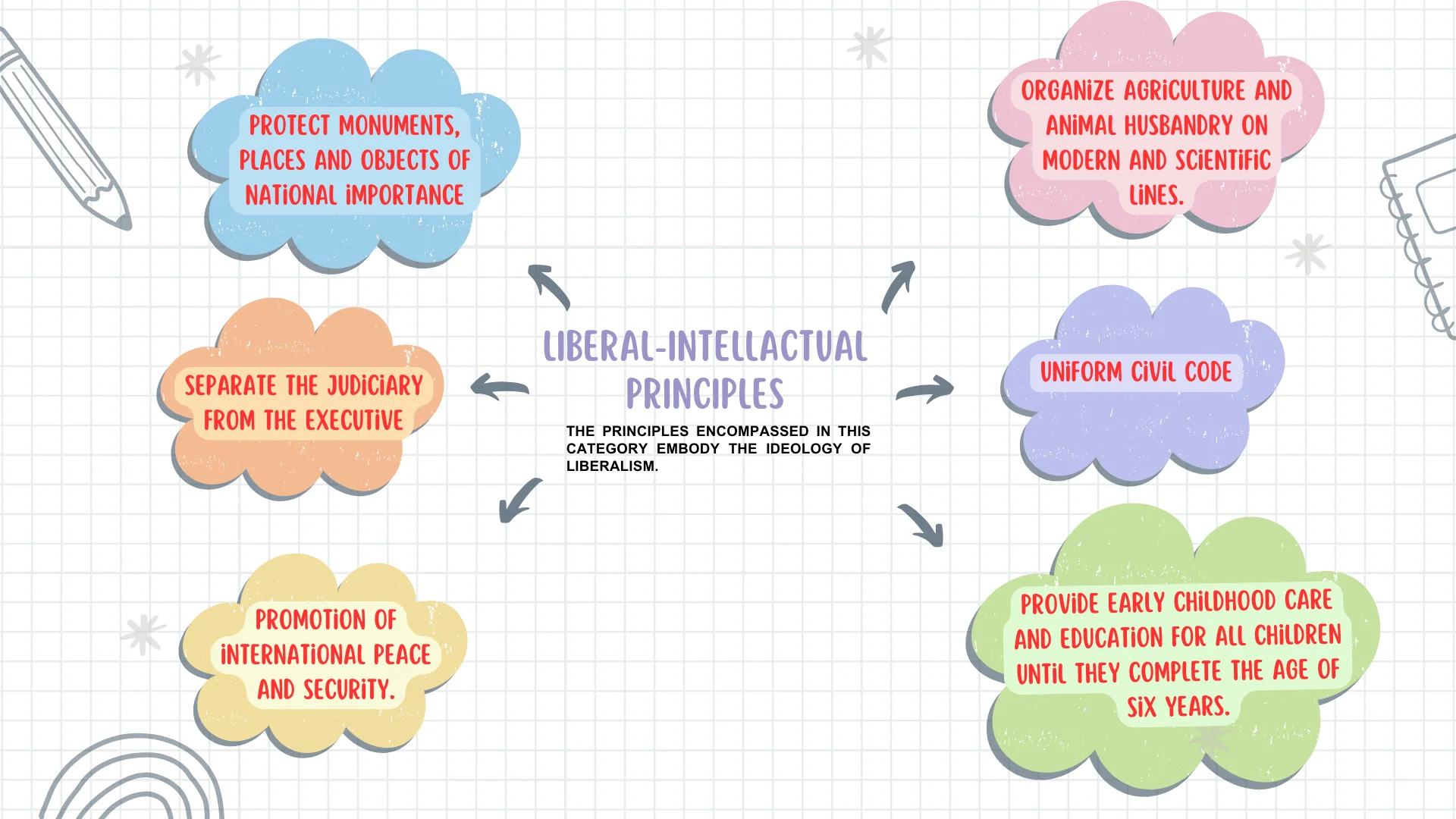Inter State border disputes have long been a contentious issue in India, posing a significant challenge to cooperative federalism. These disputes stem from a variety of factors, including historical discrepancies, conflicting interpretations of colonial-era boundary demarcations, and disagreements over resource-rich territories.
Inter-State Border Disputes in India: Challenges and Solutions
Understanding the Roots of Inter-State Conflicts
The origins of inter-State border disputes can be traced back to various factors, including:
- Reorganisation Considerations: The States Reorganisation Commission’s recommendations for State separation based on language sowed the seeds for territorial readjustments that later evolved into disputes.
- Linguistic Assertion: The reorganisation of States along linguistic lines in the 1950s fueled territorial claims from linguistic groups seeking their own Statehood or inclusion in existing States.
- Colonial Division: The demarcation of State boundaries often adhered to colonial-era district boundaries, leading to inconsistencies and disputes in the post-colonial era.
- Inequitable Resource Sharing: Territorial contests stem from unequal access to resources, particularly river waters, triggering disputes between States.
- Lack of Constitutional Mechanism: While Article 262 addresses inter-State water disputes, there is no similar provision for land disputes, creating a legal vacuum.
- Political Opportunism: The unresolved nature of disputes often serves as a political tool for parties to garner votes, hindering genuine efforts towards resolution.
Enroll now for UPSC Online Course
Suggested Approaches for Dispute Resolution
To effectively address inter-State border disputes, a multi-pronged approach is needed:
- Embracing Federalism: The idea of an integrated India should supersede fragmented State interests, fostering a spirit of cooperation and understanding.
- Geo-Cultural Approach: Acknowledging the geo-cultural linkages of people in disputed areas can form the basis for unity and shared identity.
- Rational Regional Separation: Regional separation or division should prioritise local convenience, cultural linkages, and historical ties.
Parliament’s Role in Boundary Alterations
Parliamentary Authority: The Parliament holds the ultimate authority to make decisions regarding alterations to State boundaries.
- However, this authority is not absolute and requires consultation with the concerned States, though their consent is not binding.
- Role of the Supreme Court: The Supreme Court plays a crucial role in adjudicating inter-State border disputes, providing a neutral forum for resolving these complex issues.
Key Inter-State Border Disputes in India
- Karnataka-Maharashtra: The Belgaum district, with its significant Marathi and Kannada-speaking populations, has been at the heart of a long-standing dispute between Karnataka and Maharashtra.
- Assam-Mizoram: The border dispute between Assam and Mizoram stems from discrepancies between two British-era notifications.
- Mizoram claims the 1875 boundary, while Assam asserts the 1933 boundary.
- Haryana-Himachal Pradesh: The Parwanoo region has been the focus of the dispute between Haryana and Himachal Pradesh, with Haryana claiming parts of Himachal’s territory.
- Himachal Pradesh-Ladakh: Both Himachal Pradesh and Ladakh lay claim to Sarchu, a strategically located area on the Leh-Manali route.
- Arunachal Pradesh-Assam: Arunachal Pradesh disputes the transfer of forested tracts to Assam during the reorganisation of North Eastern States. The matter is pending before the Supreme Court.
- Meghalaya-Assam: Meghalaya challenged the Assam Reorganisation Act of 1971, claiming Blocks I and II of the Mikir Hills as part of its territory.
- Assam-Nagaland: The longest-running border dispute in the North East, this conflict began soon after Nagaland’s formation in 1963 over the demarcation of Naga-dominated areas.

Should States Have Their Own Flags?
Context: The Karnataka State government has recently established a committee to explore the possibility of adopting a distinct State flag.
- This committee, composed of bureaucrats and academics, is tasked with examining the legal aspects of this matter and proposing a design for the State flag.
Jammu and Kashmir’s Unique Status
- Jammu and Kashmir was the only Indian State to currently possess an official State flag, a privilege granted under Article 370 of the Indian Constitution.
- This special status has allowed Jammu and Kashmir to fly its State flag alongside the national flag.
- However, since abrogation of Article 370 in 2019, the State flag has been removed.
Constitutional and Legal Considerations
- While the Indian Constitution does not explicitly prohibit States from having their own flags, the Supreme Court has clarified that such flags must not be hoisted in a manner that disrespects the national flag.
- The Flag Code of India, 2002, also implicitly allows for State flags as long as they maintain a respectful distance from the national flag.
Arguments for and against State Flags
- Opponents of State flags argue that the national tricolour serves as a unifying symbol for India and that permitting individual State flags could diminish its significance.
- They also raise concerns that allowing one State to have its own flag might set a precedent, leading to similar demands from other States.
Arguments For State Flags
- Proponents of State flags point to examples like Germany and the United States, where State flags coexist with the national flag without undermining national unity.
- They argue that State flags can serve as a symbol of regional identity and pride without compromising the integrity of the nation.
Karnataka’s Unofficial State Flag
- Karnataka has had an unofficial State flag since the mid-1960s, known as the Kannada Paksha.
- This red and yellow flag was created by Kannada writer and activist Ma Ramamurthy for a pro-Kannada political party.
- While not officially sanctioned, the Kannada Paksha is flown annually on November 1st, Karnataka’s foundation day, and is often seen in public settings.
Central Government’s Position
- The Indian Home Ministry has Stated that there is no legal provision either for providing or prohibiting a separate flag for any State.
- They have also clarified that if a State flag is created, it would only represent the people of the State and not the State itself.

Enroll now for UPSC Online Course
| Must Read | |
| Current Affairs | Editorial Analysis |
| Upsc Notes | Upsc Blogs |
| NCERT Notes | Free Main Answer Writing |
Conclusion
Resolving inter-State border disputes is crucial for fostering cooperative federalism and national unity in India.
- Despite their historical and political roots, these disputes can be addressed through efforts that prioritize federalism and regional cooperation.
- The debate over State flags, such as Karnataka’s initiative, underscores the tension between regional identity and national unity. Balancing local and national interests is essential for harmonious governance.
Sign up for the PWOnlyIAS Online Course by Physics Wallah and start your journey to IAS success today!
| Related Articles | |
| Bureaucracy | Supreme Court |
| State Reorganization in India | Inter-State Disputes |

 GS Foundation
GS Foundation Optional Course
Optional Course Combo Courses
Combo Courses Degree Program
Degree Program









